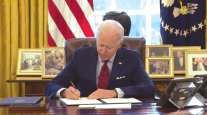ATA to Ask Supreme Court to Review L.A. Port Ruling
This story appears in the Oct. 24 print edition of Transport Topics.
GRAPEVINE, Texas — American Trucking Associations has decided to ask the Supreme Court to review portions of a U.S. Court of Appeals decision that allows the Port of Los Angeles to compel truckers who work at the port to hand over financial and maintenance information.
The decision to pursue an appeal was announced Oct. 18 by ATA President Bill Graves at a news conference during the group’s annual Management Conference & Exhibition here. He said ATA was worried that the port’s ability to gather that information from truckers could set a precedent if the provision became federal law.
“We have taken the case this far,” Graves said. “We might as well take it the final step.”
The prospect of an appeal arose after a 9th Circuit Court of Appeals decision on Sept. 26 upheld ATA’s position that the port couldn’t compel truckers to be company employees. However, the same decision, arising from an action ATA began in 2008, also upheld the port’s ability to be a “market participant” and demand certain information from any fleet wanting to haul cargo at the port.
ATA has argued since 2008 that only the federal government had the power to regulate a trucker’s rates, routes and services and that federal law pre-empts the port from regulating those activities.
On the other hand, the port argued that, as a “market participant” in the freight shipping process, it has the power to require port truckers to be employees rather than independent contractors and impose the financial, maintenance and other reporting requirements.
“We were concerned about the rates, routes and services question,” Graves explained. “The feeling was that it could set a precedent if that [market participant] status somehow becomes the law of the land.”
Curtis Whalen, executive director of ATA’s Intermodal Motor Carriers’ Conference, explained that as a “market participant,” the port could regulate a carrier’s rates, routes and services by potentially using financial, maintenance and off-street parking information to disqualify carriers.
“The market participant question could cause mischief,” Whalen said. “Our concern is that the port could arbitrarily exclude smaller companies.”
Whalen explained that the port, if it chose to exercise broader powers as a “market participant,” could bar carriers by saying that they didn’t have enough assets, didn’t have adequate off-street parking or had a deficient maintenance program.
Phillip Sanfield, a spokesman for the port, said all of the concession provisions other than the employee-driver requirement are still in force. Those include the financial, maintenance and parking information the port requires.
“Nothing has changed as a result of the 9th Circuit [Court of Appeals] ruling, and the concession is continuing to be enforced, other than the employee requirement,” he said.
The port announced after the ruling that it would not appeal the unanimous decision on the employee issue.
The employee requirement had been in question since August 2010, when ATA filed an appeal of a lower court ruling that approved the port’s concession plan. ATA successfully persuaded the appeals court last year to block the port from going forward with the employee requirement while the issue was decided by the court.
The concession requirements for financial and maintenance information have been in force since August 2010, but the parking-plan requirement took effect in July.
Whalen didn’t expect any immediate action by the port to exclude carriers because of issues with that information, he added, because it is concerned with other issues, such as the current cargo activity, which is trailing 2010 levels.
“This is no time for the Port of Los Angeles to clamp down on anything,” he said.
Speaking as IMCC’s executive director, Whalen said, “We think those regulations about market participants were improperly widened” by the ruling last month. The employee-driver question, he said, “was certainly a positive step that the port won’t appeal. That shows that the mayor has decided to end his stalwart support of the Teamsters.”
Whalen was referring to Mayor Anthony Villaraigosa, a supporter of the Teamsters union effort to organize port truckers. A lower court ruling that the appeals court overturned required Los Angeles truckers to be employees, a status that would have facilitated a union organizing drive, rather than independent contractors.
The Los Angeles concession plan, created as an outgrowth of its Clean Air Action Plan, first announced in 2006, was intended to reduce truck exhaust emissions. The Port of Long Beach also participated in that program but chose not to impose a ban on owner-operators.




